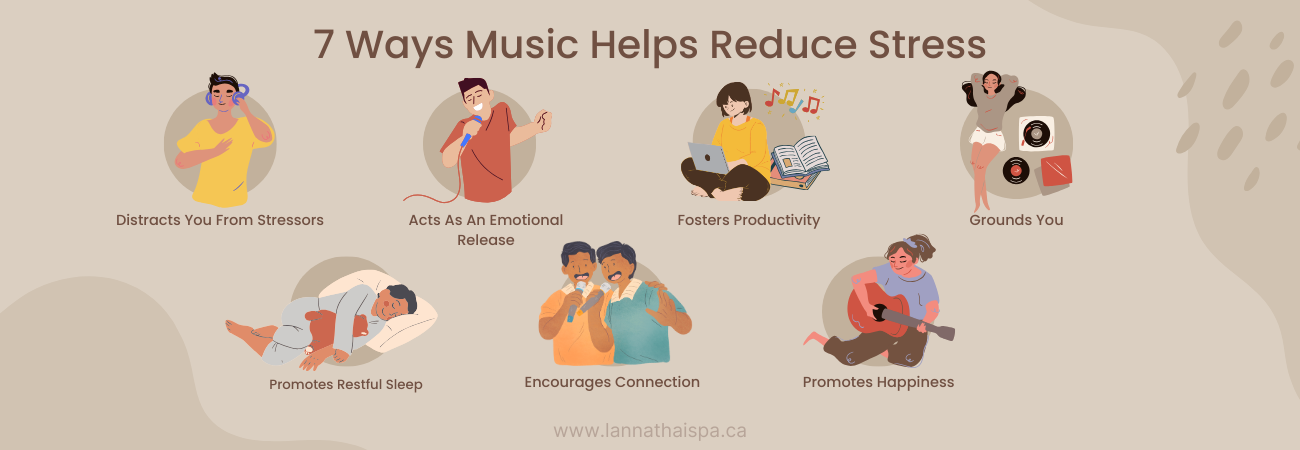Photo Credits to www.theladders.com
Learning about how music helps reduce stress will allow you to use it as a simple and effective tool for relaxation in your everyday life. Listening to music is a proven way to help calm the mind, manage anxiety, relieve tension, and lift your spirits. In stressful situations, it helps create a sense of comfort and can be an easy, accessible way to improve your overall well-being.
A big part of why we can effectively reduce stress with music is because it can have significant effects on both our mind and body. Listening to upbeat music brings in good vibes and promotes optimism and positivity. Fast music helps you concentrate better and make you feel alert. Softer, slower music helps clear the mind and soothe tensed muscles. Whatever type of music you listen to, it contributes to relaxation and stress management.
How Music Helps Reduce Stress
How exactly can you reduce stress with music? Listening to music provides us with many mind and body benefits, which in turn contributes to stress relief. According to recent research, some notable health benefits of listening to music include lower heart rate and cortisol (stress hormone) levels, release of endorphins (“feel-good” hormones), improved sense of well-being, and reduced physical and emotional stress levels. Here’s how music helps reduce stress:

Music Distracts You From Stressors
Your mind is on overdrive when you’re feeling stressed, and music can be an effective tool for providing distractions and taking your mind off of difficult situations. Music has the power to shift your mood and help you refocus your energy.
Music therapist and author of Sonic Recovery: Harness the Power of Music to Stay Sober Tim Ringgold says “Because music cognition is so complex for the human brain, it offers an easy distraction or diversion from any competing internal or external stress stimuli. Since music triggers a pleasure response, our brain is all too happy to focus on a music signal to the exclusion of anything else.”
So when you’re feeling anxious, stressed, or overwhelmed, play your favorite song or some soothing music to calm your mind and relax your body. Let the rhythm or melody take over, and you’ll likely find it easier to manage stress and feel more at ease.
Music Acts As An Emotional Release
While listening to music relaxes your mind and body, making music can help you release compressed energy or suppressed emotions. Singing or playing instruments allows us to express and process feelings that may be difficult to articulate with words.
Whether it’s joy, sadness, or frustration, music can provide an outlet for emotions, helping release pent up stress. This emotional connection helps us feel understood, validated, and more in tune with our inner selves, and the physical and mental act of making music can effectively get those feelings out of your body and mind.
Music Fosters Productivity
If you’re feeling stressed in your workplace, play some music. Not only will it relax you and boost your mood, but it can also improve focus and increase your productivity while you work. Play instrumental or upbeat music if you want to maintain a steady workflow or keep distractions at bay, or listen to slow, calming tunes to enhance your concentration and reduce feelings of anxiety.
In addition, music helps create a positive environment in the workplace and boost the motivation of workers, which is especially helpful if your job involves routine work – listening to music helps repetitive tasks feel more engaging and enjoyable. According to a recent study on a number of operating room staff, having 30-minute music listening sessions each day at work for a month, the workers reported reduced stress and less emotional exhaustion, helping prevent burnout.
Music Grounds You
Stress often roots from the feeling of lack of control. Ringgold suggests that moving to the beat of music, whether it’s clapping along to the beat, tapping, snapping, or dancing, can help one feel like they’re back in control, which in turn helps reduce stress. He says “The mind prefers to focus on situations where it has some semblance of control. The only place in time this occurs is in the present because that is where our bodies are, and we at least have some control over our bodies.”
Music grounds you by bringing your focus back to the present moment, helping to calm racing thoughts and reduce feelings of anxiety. It can serve as an anchor, providing a sense of stability and peace when moments feel overwhelming.
Music Promotes Restful Sleep
Lack of good quality sleep goes hand in hand with stress. The mind is on high alert, making it difficult to shift into a sleep state. If you’re having a hard time sleeping, turn off the lights, find your comfortable position in bed, and listen to soothing music – it triggers the release of feel-good chemicals in the brain, helping wind down and relax and signaling your body that it’s time for rest. You’ll wake up the next day feeling refreshed and energized.
According to a 2018 survey, 62 percent of respondents say that they play music to help them fall asleep, mostly because it relaxes them, and distracts them from daily stressors. Those who used music less were more likely to have lower quality sleep.
Music Encourages Connection
Connecting with others is essential during difficult situations. When you’re stressed, others can provide emotional support, helping you feel understood, and offering a sense of belonging. Since listening to music alone helps combat stress, it’s even more effective when you use it to connect with others.
“When we play music alone, we connect to the music,” Ringgold says. “When we play music with others, we connect to them by proxy. One voice, one melody, one rhythm, all connected in the present moment.”
Music Promotes Happiness
Perhaps one of the best ways that music helps fight stress is its ability to create feelings of happiness to listeners. A 2021 study showed that adults who listened to both personal and neutral selections of music, regardless of genre, at home and in a laboratory environment, had significantly “reduced cortisol levels.”
Cortisol is known as the “stress hormone”, which is reduced whenever you listen to music you enjoy. Enjoying music will not only help fight stress, but it can also give you feelings of happiness.
Wrapping Up
Now that you know how music helps reduce stress, it’s time to get your favorite playlist ready. Listen to your favorite songs often, not just when you’re stressed, and you’ll find that you’re happier, more relaxed, and more centered.



